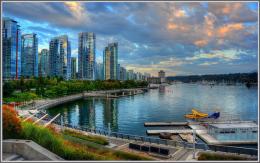How a green Vancouver is benefitting from China's toxic wealth

Photo credit: TD Lucas
By Jagdeesh Mann (@jagdeeshmann)
Special to The Post
Against the backdrop of this past month’s historic Paris Agreement for climate change, a modern tale of two cities was playing out.
Officials from Vancouver, led by Mayor Gregor Robertson, were in Paris to receive the C40 Cities Award in the category of carbon measurement and for city’s Greenest City Action Plan to make metropolis the greenest city in the world by 2020.
Meanwhile on the other side of the world in Beijing, city officials issued a red alert and were excoriated by international press as the Chinese capital became toxic snow-globe of coal emissions and diesel fumes.
While verdant Vancouver was lavished with praise, filthy Beijing and the Chinese government was humiliated as the city came to a standstill.
Smog in Beijing, smug in Vancouver: for every breath of carbon-laced soup inhaled by Chinese residents, someone in Vancouver strolled out of their multi-million dollar house to gulp down their equivalent of the pure mountain-filtered variety. On the surface, these pair of respiratorial experiences would seem unrelated. However, given the billions of dollars flowing out of China and landing in Vancouver real estate, it seems that the dirtier a butterfly gets when flapping its wings in China, the ‘greener’ Vancouver becomes.
According to the UBS Group, an estimated US$324 billion was moved out of China and into foreign destinations in 2014. In the single month of September 2015, after China devalued the yuan, Goldman Sachs estimated another $200 billion flowed into cities like Vancouver, Sydney, and New York. Add to these capital outflows, the migration of 45,000 millionaire migrants to Vancouver between the years 2005-2012 through the now-defunct Immigrant Investor Programme and the currently active Quebec Immigrant Investor Programme.
It is not surprising that this mass exodus of wealth from China has led to buyers from there accounting for over 70% of sales in 2014 of single-family homes, condos and townhomes over $3 million in Vancouver – these findings according to Vancouver’s McDonald Realty that were also independently corroborated by the UBC Professor Andy Yan in his recent study.
It was 2008 when Gregor Robertson launched Vancouver’s version of its own green revolution – the same year as the global financial crisis. Since then prices of detached houses in the city have nearly doubled to 1.5 million.
While the mayor and his team credit their policy shift as one of the drivers behind Vancouver’s ‘booming’ economy, as attested by skyrocketing real estate prices, in reality it has been the other way around. The city’s transition into an urban hedge fund for outflows of Chinese capital has fueled the city’s LEED certified city towers, bike lanes, and well-trimmed parks.
The financial gains of China’s economic revolution have come at the expense of severe environmental degradation – these ‘negative externalities’ have benefited the few at the considerable expense of the many. Fearing retribution and possible persecution, these beneficiaries, or China’s 1%, have resorted to burying some of their stash in cities like Vancouver, where now the many homeowners here have instead gained from the actions of these few.
But with so much money to be made, it only makes sense that Vancouver’s dominant employment sector is by far construction related industries. By some estimates, one quarter of all economic activity in the city is related to housing thus explaining the city’s disproportionate number (12,000+) of real estate agents.
Vancouver’s booming real estate market has provided the city a cushion of time and resources to implement its Greenest City Action Plan and grow gree collar jobs. Eight years into office, Robertson and his team have little to show in terms of a booming green industry and its corresponding job growth.
This was evident in the 2014 Vancouver Economic Council’s Green Jobs Report which the mayor’s office lauded as a proof of victory. Of the 20,000 ‘green jobs’ inventoried in the report, nearly 5,000 were in (green) construction. Another 6,000 were in what is called the ‘local foods’ sector composed of the city’s myriad number of craft breweries, restaurants, and food trucks. Jobs as dishwashers or servers in local vegan restaurants are neither ‘green revolutionary’ nor positions that will yield a six figure salary to allow one to buy a home in the most expensive city in North America.
Yet while high-paying green collar jobs sputter short of expectations, Robertson has not yielded on his ideological position and continued to snub heavy industry which could fill some of this slack. In 2014, the mayor railed against the twinning of the Trans-Mountain Pipeline and against the corresponding increase in oil tanker traffic in Burrard Inlet.
It is fair to say our politicians are not responsible for China’s carbon policies and lack of policing. But the city’s reliance on wealth that is stained with a thick coal-black carbon ribbon certainly does not make Vancouver a Green Silicon Valley. It also merits calling into question Vancouver’s Volkswagen like claims of being The G.O.A.T. (Greenest of all time), no matter how many of us bike to work, compost our organic waste, or shorten our showers.
If cities like Edmonton are tainted by their economic link to Alberta’s oil sands, Vancouver is equally so in its addiction to toxic Chinese wealth.
In Paris, Mayor Robertson proclaimed it is now outdated for governments to have to choose between the economy and the environment. “There’s no way you can credibly say that anymore,” he said to local media on the heels of the summit. “Vancouver is a great example of a city where we’ve taken strong environment action fighting climate change and we have the strongest economy of any city in Canada.”
Perhaps that may be so, but that statement deserves a big fat asterisk given the money is coming from a place the mayor himself would be left gasping for air.
This piece was orginally published in The Globe & Mail.









